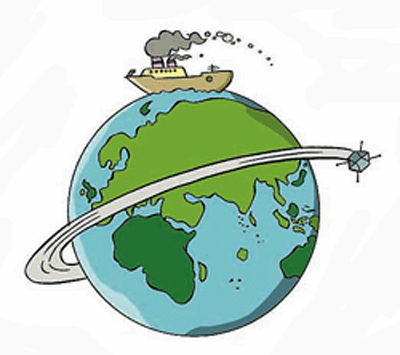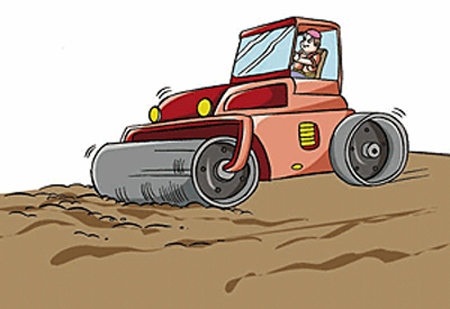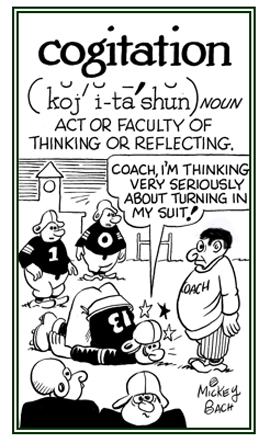-ation, -ization (-iz[e] + -ation); -isation (British spelling variation)
(Greek > Latin: a suffix; action, act, process, state, or condition; or result of doing something)
Although there are over 1,450 word entries ending with -ation or -ization listed in this unit, there are certainly many more which exist in the English language. At any rate, this unit provides a significant number of -ation and -ization examples for you to see.
A stroll or a walk for leisurely pleasure or for exercise: Janet goes on a circumambulation in her neighborhood every day whenever the weather permits it.
1. The act of turning, rolling, or whirling around.
2. A revolution or circular movement.
3. The turning of a limb of the body in its socket.
2. A revolution or circular movement.
3. The turning of a limb of the body in its socket.
1. The act of traveling around something (by ship or plane).
2. Sailing all the way around something.
3. Moving around something in order to avoid hitting it.
4. A satellite or small body in orbit around a larger body; such as, the earth or another celestial body.

2. Sailing all the way around something.
3. Moving around something in order to avoid hitting it.
4. A satellite or small body in orbit around a larger body; such as, the earth or another celestial body.

Two examples of circumnavigation on the earth and in outer space.
1. The act of rolling or revolving around; such as, a wheel.
2. The state of being whirled around.

2. The state of being whirled around.

An example of circumrotation is displayed with this construction equipment.
1. An official document, or speech, that praises someone's actions, accomplishments, or character: Adam was given a citation because when he was in the armed forces he showed great bravery.
2. A quotation from an authoritative source that is used to support an idea or an argument or something mentioned as proof for a reason why something has happened: Robert quoted words taken from a citation of a particular writer's publication to establish what he was suggesting had the support of a professional.
3. A reference to a previous decision by a court or legal authority, specifying precisely where it is documented: Carol presented a citation which was officially mentioned in a court of law for someone to officially appear on a specific day.
2. A quotation from an authoritative source that is used to support an idea or an argument or something mentioned as proof for a reason why something has happened: Robert quoted words taken from a citation of a particular writer's publication to establish what he was suggesting had the support of a professional.
3. A reference to a previous decision by a court or legal authority, specifying precisely where it is documented: Carol presented a citation which was officially mentioned in a court of law for someone to officially appear on a specific day.
1. A condition which exists when people have developed proper ways of organizing a society and who care about art, science, education, living conditions, etc.: Technical advances have had an impact on modern civilization.
2. Well-developed and organized cultures: The history class is studying the ancient Egyptian civilization and then they will take a look at the Greek civilization.
3. A place where things are modern and there is electricity, hot water, and other conveniences: Max had enough camping with his family and he wanted to get back to civilization and his computer games and social contacts.
2. Well-developed and organized cultures: The history class is studying the ancient Egyptian civilization and then they will take a look at the Greek civilization.
3. A place where things are modern and there is electricity, hot water, and other conveniences: Max had enough camping with his family and he wanted to get back to civilization and his computer games and social contacts.
clarification
classification
1. The process of forming semisolid lumps in a liquid: Coagulation can take place in milk and in milk products.
2. In medicine, the clotting of blood or the process by which the blood clots to form solid masses: Tissue can also be subjected to coagulation by various means, as by electrocoagulation (coagulation [clotting] of tissue using a high-frequency electrical current applied locally with a metal instrument or needle with the aim of stopping bleeding); laser coagulation (produces light in the visible green wavelength that is selectively absorbed by hemoglobin, the pigment in red blood cells, in order to seal off bleeding blood vessels); or photocoagulation (coagulation [clotting] of tissue using a laser which produces light in the visible green wavelength that is selectively absorbed by hemoglobin, the pigment in red blood cells, in order to seal off bleeding blood vessels).
2. In medicine, the clotting of blood or the process by which the blood clots to form solid masses: Tissue can also be subjected to coagulation by various means, as by electrocoagulation (coagulation [clotting] of tissue using a high-frequency electrical current applied locally with a metal instrument or needle with the aim of stopping bleeding); laser coagulation (produces light in the visible green wavelength that is selectively absorbed by hemoglobin, the pigment in red blood cells, in order to seal off bleeding blood vessels); or photocoagulation (coagulation [clotting] of tissue using a laser which produces light in the visible green wavelength that is selectively absorbed by hemoglobin, the pigment in red blood cells, in order to seal off bleeding blood vessels).
1. The union or articulation of two or more speech sounds together, so that one influences the others.
2. The connection of bones to form joints.
2. The connection of bones to form joints.
codification (s), codifications (pl)
1. The process of creating systematic rules to govern a specific activity; such as, the cataloging of bibliographic materials.
2. The systematic arrangement of laws, rules, etc.
3. One of the forms of systematization of laws and other legislative instruments regulating some field of social relations.
4. The collection of the principles of a system of law into one body or organization.
5. The act, process, or result of stating the rules and principles that are applicable in a given legal order to one or more broad areas of life in this form of a code.
2. The systematic arrangement of laws, rules, etc.
3. One of the forms of systematization of laws and other legislative instruments regulating some field of social relations.
4. The collection of the principles of a system of law into one body or organization.
5. The act, process, or result of stating the rules and principles that are applicable in a given legal order to one or more broad areas of life in this form of a code.
coeducation, co-education (s) (noun); coeducations, co-educations
The activity of students who are leaning consists of both genders or including both males and females or boys and girls: The coeducation that Tom and Mary received was at the same school which was noted for its excellent teaching by the instructors.
1. Thoughtful and attentive consideration and meditation: After much cogitation and mulling over, James decided to take the offer of the job in his hometown.
2. A careful and serious mental reflection about something: David applied all of his cogitation and energy, contemplating what topic he should take for the next term paper in his science class at school.

© ALL rights are reserved.
Go to this Word A Day Revisited Index
2. A careful and serious mental reflection about something: David applied all of his cogitation and energy, contemplating what topic he should take for the next term paper in his science class at school.

Go to this Word A Day Revisited Index
so you can see more of Mickey Bach's cartoons.
cognomination
1. In Roman usage: the third name, family name, or surname of a Roman citizen; such as, Marcus Tullius Cicero, Caius Julius Caesar.
2. An additional name or epithet bestowed on individuals, as Africanus, Cunctator (in later Latin called agnomen).
3. A surname or family name.
4. A nickname or name that describes someone, e.g., “Billy the Kid”.
2. An additional name or epithet bestowed on individuals, as Africanus, Cunctator (in later Latin called agnomen).
3. A surname or family name.
4. A nickname or name that describes someone, e.g., “Billy the Kid”.
1. An emotional and physical relationship that includes a common living place and which exists without legal or religious sanction: The cohabitations of two couples existed in the two houses next door to each other.
2. The act of dwelling in or living in a place which may include both animals and/or humans: The cohabitation of two or more species of animals in the same area."
2. The act of dwelling in or living in a place which may include both animals and/or humans: The cohabitation of two or more species of animals in the same area."


